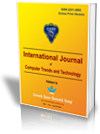The AI Revolution in Healthcare Product Management |
||
 |
 |
|
| © 2024 by IJCTT Journal | ||
| Volume-72 Issue-2 |
||
| Year of Publication : 2024 | ||
| Authors : Santhosh C Andrew Devadoss | ||
| DOI : 10.14445/22312803/IJCTT-V72I2P101 | ||
How to Cite?
Santhosh C Andrew Devadoss, "The AI Revolution in Healthcare Product Management," International Journal of Computer Trends and Technology, vol. 72, no. 2, pp. 1-8, 2024. Crossref, https://doi.org/10.14445/22312803/IJCTT-V72I2P101
Abstract
Artificial Intelligence (AI) is revolutionizing several industries, including healthcare, with its rapid advancement (Lee and Yoon). Specifically, by improving patient care and results, AI can completely transform healthcare product management. This study examines how Artificial Intelligence (AI) is revolutionizing healthcare product management. It covers applications, advantages, difficulties, and potential future developments. Healthcare product managers can enhance patient experiences, expedite operations, make better decisions, and ultimately spur innovation in the sector by utilizing AI technology.
Keywords
Artificial Intelligence (AI), Healthcare, Product management.
Reference
[1] Patrick Adler et al., “The City and High-Tech Startups: The Spatial Organization of Schumpeterian Entrepreneurship,” Cities, vol. 87, pp. 121-130, 2019.
[CrossRef] [Google Scholar] [Publisher Link]
[2] Adam Bohr, and Kaveh Memarzadeh, “Chapter 2 - The Rise of Artificial Intelligence in Healthcare Applications,” Artificial Intelligence in Healthcare, pp. 25-60, 2020.
[CrossRef] [Google Scholar] [Publisher Link]
[3] Kathryn Bouskill et al., “Blind Spots in Telemedicine: A Qualitative Study of Staff Workarounds to Resolve Gaps in Diabetes Management,” BMC Health Services Research, vol. 18, pp. 1-9, 2018.
[CrossRef] [Google Scholar] [Publisher Link]
[4] Thomas Davenport, and Ravi Kalakota, “The Potential for Artificial Intelligence in Healthcare,” Future Healthcare Journal, vol. 6, no. 2, pp. 94-98, 2019.
[CrossRef] [Google Scholar] [Publisher Link]
[5] Jonathan M. Kocarnik et al., “Cancer Incidence, Mortality, Years of Life Lost, Years Lived with Disability, and Disability-Adjusted Life Years for 29 Cancer Groups from 2010 to 2019: A Systematic Analysis for the Global Burden of Disease Study 2019,” JAMA Oncology, vol. 8, no. 3, pp. 420-444, 2021.
[CrossRef] [Google Scholar] [Publisher Link]
[6] DonHee Lee, and Seong No Yoon, “Application of Artificial Intelligence-Based Technologies in the Healthcare Industry: Opportunities and Challenges,” International Journal of Environmental Research and Public Health, vol. 18, no. 1, pp. 1-18, 2021.
[CrossRef] [Google Scholar] [Publisher Link]
[7] Randi Vita et al., “The Immune Epitope Database (IEDB): 2018 Update,” Nucleic Acids Research, vol. 47, no. 1, pp. 339-343, 2019.
[CrossRef] [Google Scholar] [Publisher Link]
[8] J. Xu et al., “Salivary Glands: Potential Reservoirs for COVID-19 Asymptomatic Infection,” Journal of Dental Research, vol. 99, no. 8, pp. 871-989, 2020.
[CrossRef] [Google Scholar] [Publisher Link]
